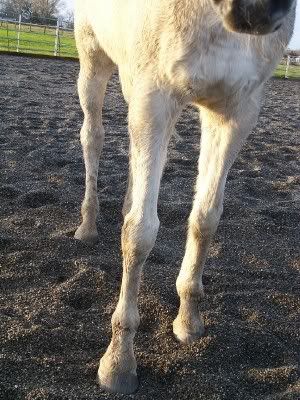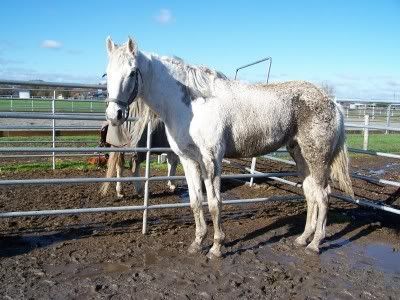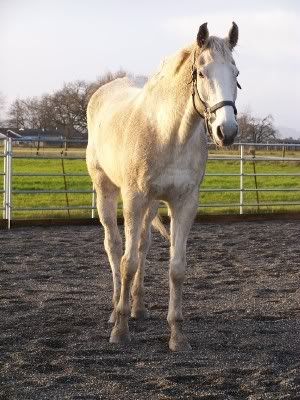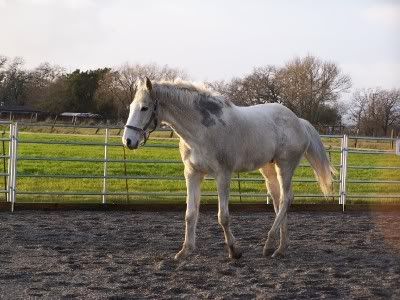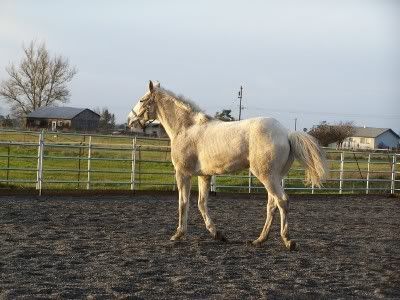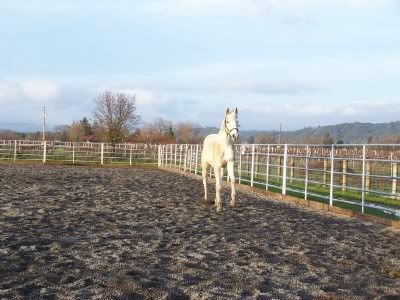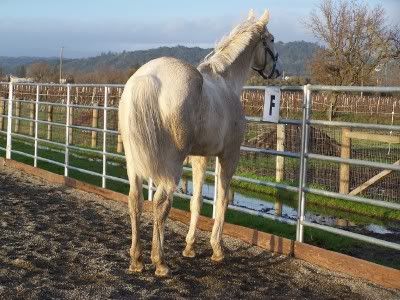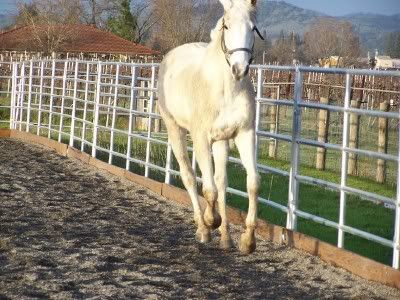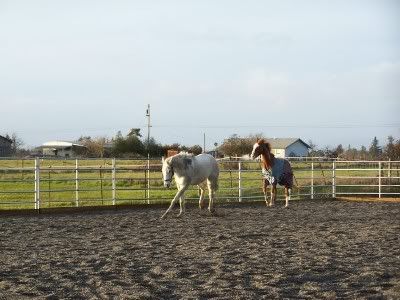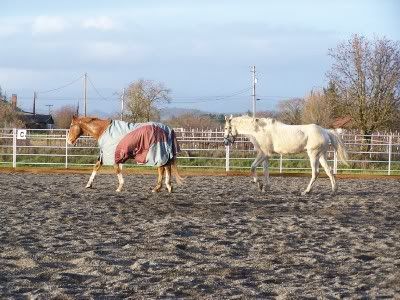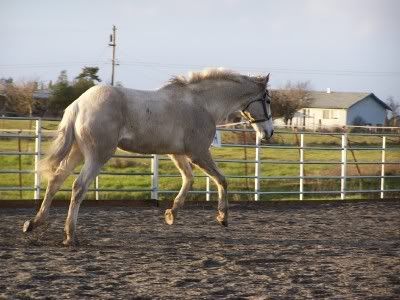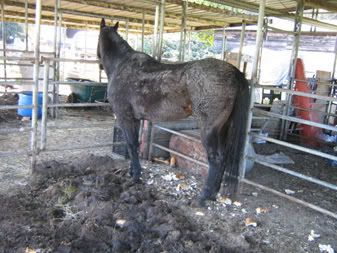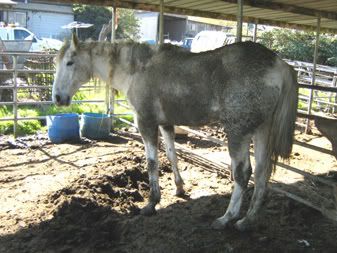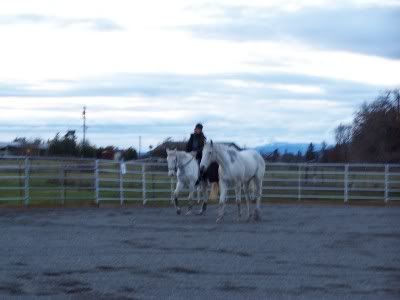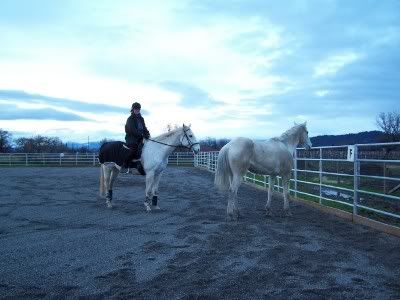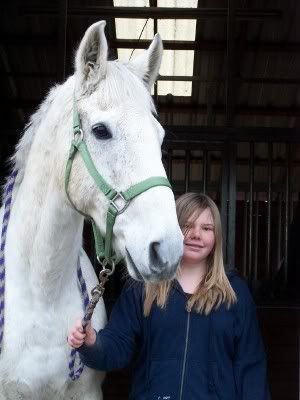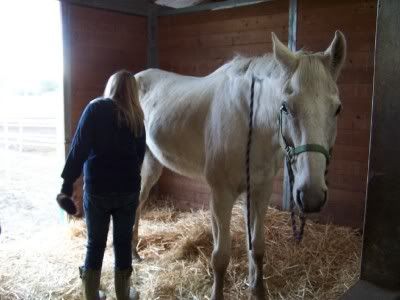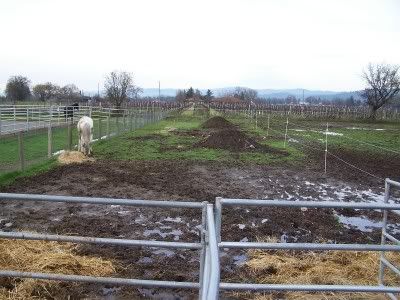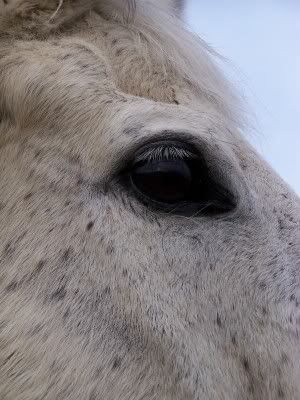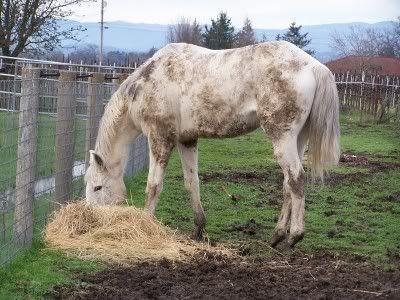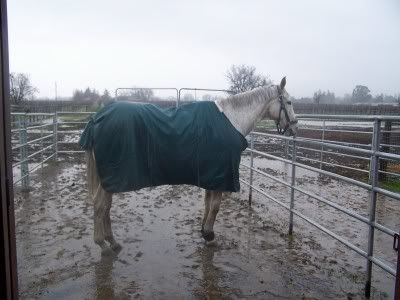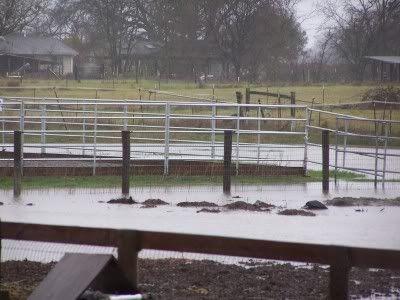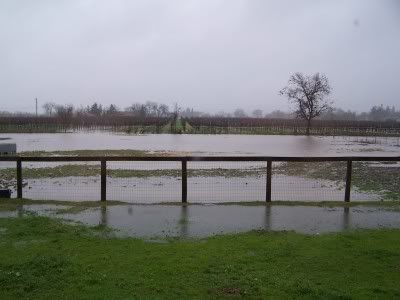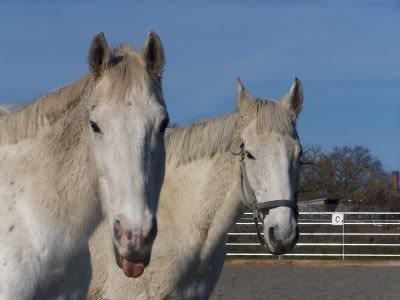Argus saw Dr. Miller, last week. After a month of good feed and TLC, it seemed time for Argus to have his first vaccination. Perhaps the first he's ever had. Argus is not a big fan of shots, nor, frankly, of Dr. Miller (Argus thinks Dr. Miller has needles in his fingers). Dr. Miller spent some time visiting with Argus, who eventually stood, brave and still, for his shots.
Argus just keeps blooming; he is turning into such a nice, gentle horse. Every day something new. When he arrived four weeks ago, I could hardly touch him. A few days ago, I removed the safety halter that he's worn 24/7. I had been working on haltering Argus
over the safety halter (as if it were not there). He flipped his head and snorted nervously at first. As the days passed, haltering him became just another thing we do. The other night, I looked at Argus, all tucked in for the night, and realized it was time to remove the halter. He no longer needed to wear it all the time.
So now I walk in with halter and lead in my hands, and Argus doesn't move away from me. Instead, he looks at me with happy, eager eyes, and moves toward me. I hold out the halter, and he puts his nose in it. He
wants me to touch and pet him. He likes it!
Amazing how far he's come in a month.
I can lead him all over the farm. I have even caught myself leading him casually, one handed, as one might do with an seasoned old horse. Yes, he still spooks, and yes, he still shakes. But he literally follows my lead, and trusts me to take him to safe places.
Just like a regular horse.
One of the things Dr. Miller and I discussed at our recent appointment is the troubling fact that Argus
never sleeps. I hadn't quite realized this until just last week. I had noticed that he was developing "bed sores"on the front of his fetlocks, big ugly sores from laying down in the hard paddock. I figured he was sleeping outside, afraid to lay down in the stall. I put upside-down bell boots on him to protect his fetlocks.
Then one day, when I was grooming him, it hit me:
he is never dirty in the morning. He is NOT laying down. How is he getting these sores, then?
I know that Argus is capable of getting down and up quite easily. I've seen him rolls dozens of times in the arena.
Then one day, last week, I looked out the window, just in time to see a dozing Argus come crashing, momentarily, to his knees. He had literally collapsed from exhaustion.
Dr. Miller says that horses do this when they are extremely sleep-deprived. Horses need something like 30-45 minutes per day of REM sleep ---- deep, rapid-eye-movement sleep which can only be achieved laying down, eyes closed. They can go without REM sleep for a number of days ---- but a month? Not without problems.
So the fetlock sores were an indication of a serious problem: Argus, for many reasons, was so hypervigilant that he could not go to sleep. I began to worry.
Sunday night, we filled Argus' stall with more straw than we've ever seen stuffed into a 12x12 box stall. He stood outside, in the paddock, watching me and my two daughters spread two huge bales of straw, banking it so high against the walls that the stall looked like a cradle.
Then, with Argus still watching, we all three lay down in it. "We want you to do this tonight, Argus!" we all told him. "You are very tired; you need to lay down. It's safe to do that in the stall."
We laughed, and went in to dinner.
Monday morning, Demi, my 12-year-old, rushes in from the barn. She had a triumphant look on her face. "Mom," she yells, "It's Argus! He has STRAW in his tail, and on his blanket!!!"
Sure enough, when I went out to feed, Argus looked rested. A tad proud, perhaps? Had he watched us putting down straw, then laying in it ourselves, and really truly figured out what we were trying to tell him?
********************************************************************************
Yesterday, I blanketed Argus. Normally, blanketing Argus is a rather exciting affair, with me holding his halter, and Argus lurching forward, and me s-l-o-w-l-y unfolding the blanket over his back. We stop often for praise and pets. He is basically very nice about it all, just afraid. I have learned to blanket him only when I am not in a hurry.
But yesterday, in keeping with this new sense of "groundedness" that Argus is displaying, blanketing was just another horsey chore. I held the lead rope loosely. Patted him, showed him the blanket, rubbed it against his chest like we always do. And slowly laid it over his withers, folded. He stood still. He sighed deeply. He does love his blanket. Buckled it around his chest. No problem. Straightened it across his back, no movement. Pulled the tail flap down over his tail, a little jump forward as the tail rope gooses him a bit. But that was it. I hugged him and told him what a fine boy he was. Buckled the belly straps and took off his halter.
I am amazed, sometimes, how patient and forgiving and sweet and kind and valiant Argus is. I guess that's why he survived for so long.
People ask me this often: "HOW did he survive for nearly 16 years in a paddock, without good feed,worming, foot care?" After all, we work hard to keep our horses healthy.
I think it's just this: Argus is a special old soul. He is different from most horses.
*********************************************************************************
Our stall/paddocks have gates at the end that open into a 3 acre pasture. This makes for easy turnout.
The other day, we erected an electric cross fence and created a 36 x 200 "mini pasture" behind Argus' gate. After a month of handwalking, and turnout in various small paddocks and the arena, it's high time for Argus to have more room.
This is a hard time of year for turnout, and our place is wet and muddy. But I know Argus well enough now to know that he is not the reckless type, and he will not tear around. He seems to know the arena is the place for this.
So today, Argus now has a muddy, wonderful, grassy, exciting pasture of his very own. He can go out in it any time he wants. But he doesn't. He is afraid, and must be coaxed and led out into the mud, for this kind of mud is new to him, and wide open spaces are new to him. But still, I think he likes knowing, as he stands in his paddock, weaving nervously in front of the open gate, that freedom is there. All he has to do is cross the threshold.
